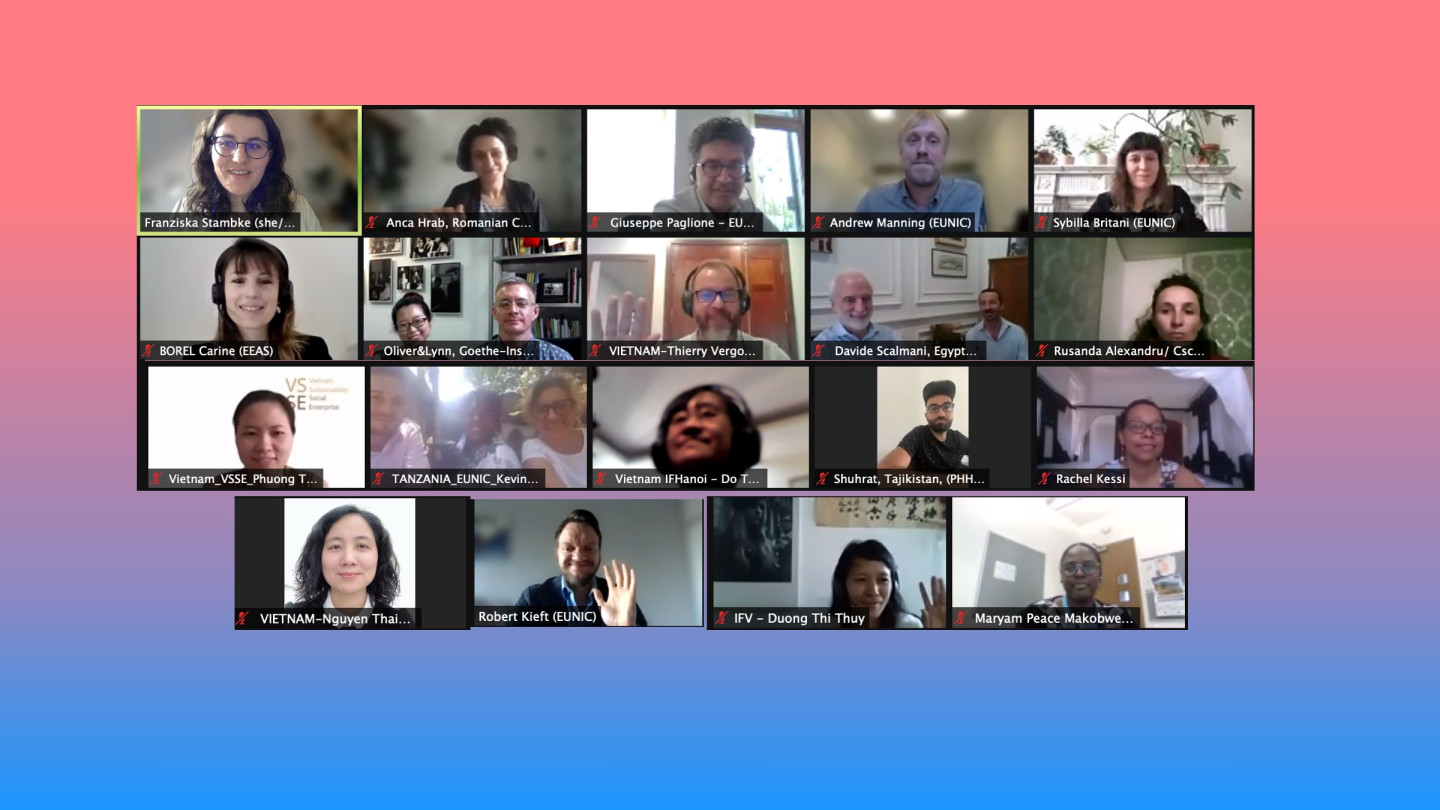
"How can cultural work evaluate and create new dimensions of community that is necessary, also with regard to peace building?"
On 28 and 29 September, the Creative Lab for European Spaces of Culture brought together representatives from the 14 selected project teams as well as external experts to discuss how their proposed idea can be elaborated further to be presented as model of European Spaces of Culture.

The Creative Lab took place online via Zoom in the form of two sessions over two days. Over 70 project participants, representing local partners, EU Delegations and EUNIC members from the different teams, joined the sessions which were split up in two main groups to accomodate the large time zone difference between the countries.
Coordination is key to success.
Carine Borel, European External Action Service
In a brief introduction round, each project team had the chance to pitch their idea and highlight their innovative approach, in which multidisciplinary approaches, innovative partnerships, multiregional strategies and the use of hybrid formats to reach out to large audiences were mentioned widely. Robert Kieft from the EUNIC office gave an introduction to the idea behind the European Spaces of Culture Preparatory Action, followed by Carine Borel, representing the perspective from the European External Action Service who emphasised the shared responsibility in bringing the projects to life: "Coordination is key to success".
In looking back on lessons learned from the first phase of European Spaces of Culture, the Creative Lab was joined by team members from the first round of European Spaces of Culture Ammanuel Felleke (Tibeb Be Adebabay, Ethiopia), Karla Chévez (Triángulo Teatro, Central America), Jan Ramesh de Saram (Colomboscope, Sri Lanka) and Céline Martin (Nogoonbaatar, Mongolia).
They provided participants with advice based on their first-hand experiences of having gone through the application and implementation process of the first phase of European Spaces of Culture themselves. In particular, the need for a strong local partnership and appreciation of local experts and artists was raised:
Involve a strong local partner that understands the local needs, that acts as an umbrella and has its own network of local organisations that you can tap into.
Jan Ramesh de Saram, Colomboscope (Sri Lanka)
Appreciate local expertise in the country you are in and dedicate fair amount of money to local experts and artists.
Céline Martin, Nogoonbaatar (Mongolia)
Additionally, jury members Natasha Ginwala (curator and writer as well as Artistic Director of Colomboscope) and Marijana Cvetkovic (independent cultural manager and co- founder of the platform for theory and practice of the commons, University of Arts in Belgrade) offered their insights into the selection process, shared their general impressions of all selected project ideas and offered the teams some tips to consider while continuing working on their application. They focused on both partnership building process and the implementation of the projects.
Consider that there will be conflict, which is inherent to the structure of culture & social practices. How can cultural work evaluate and create new dimensions of community that is necessary, also with regard to peace building?
Natasha Ginwala, Jury member European Spaces of Culture
For a perspective on fair and equal partnerships in the process of the application and implementation of their projects, participants also got to join an interactive intervention by members of the Fair Collaboration Team, Matina Magkou and Sudebi Thakurata who presented the findings of the ongoing development of a set of user-centered tools for fair collaboration in cultural relations, commissioned by EUNIC. The session was concluded by a presentation on guidelines for hope-based communication and finding a narrative by Franziska Stambke from the EUNIC office.
The selected project teams are now invited to further develop their ideas into concrete proposals for projects taking place between January and October 2022. Deadline for submission of the final project proposals will be 4 November 2021.
